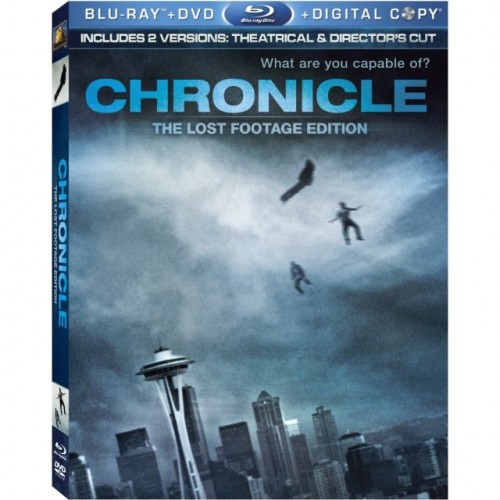Home Video Hovel- Chronicle, by Tyler Smith
The superhero movie has become such a familiar genre to us that almost any creative variation on it is refreshing to me. Movies like Unbreakable or Super or even Kick-Ass put a much more human face on the idea that regular people can suddenly be capable of extraordinary things. Though these movies are often still quite stylized, they remain mostly grounded in the reality that you and I encounter on a day to day basis.
Then along comes Chronicle, by far the most realistic superhero movie to come along in a while. Quite possibly the most realistic ever, now that I think about it. And when I talk about its realism, I’m mean both emotionally and practically. The story is about three teenagers suddenly imbued with super powers. Not surprisingly, the film takes its time in allowing these characters to fully come to grips with just what they are able to do. There is a feeling of genuine wonder and discovery and it is in these scenes that we get a strong sense of how such events would probably play out in real life.
The reason that the film is required to be so realistic is an unfortunate one. Chronicle is the latest in a long line of “found footage” films; movies that are seemingly assembled from raw footage taken by the characters themselves. There is little editing and the cameras are extremely shaky to give us a you-are-there feel. The movie that kicked this off was the incredibly successful The Blair Witch Project, which was about three film students documenting their own sealed fate.
The inherent problem with Chronicle and, indeed, every other found footage movie (including Blair Witch Project) is that, sooner or later, the audience has a hard time believing that the characters would keep the cameras rolling for that long. It doesn’t really matter what genre it is; eventually we’ll start to get the feeling that the characters are filming not because they want to, but because the script requires them to. The film bends over backwards to make sure that somebody somewhere always has a camera. There is even a moment when our heroes goes to his ex-girlfriend’s house and she answers the door holding a camera.
“You don’t mind if I record this, do you?” She asks. He shrugs it off as if it were nothing.
But, wait, why does she want to record him? Is this for security reasons? Was their relationship such that she feels the need to have a record of their interaction? It makes no sense, except that the filmmakers wanted us to see this scene and couldn’t include it unless there was found footage. By the end of the film, it just gets to be ridiculous, to the point where it took me out of the movie.
This is a shame, too, because there is a very good movie going on here. The characters are beautifully conceived and the story is not the usual predictable fare. Instead, we get interesting, believable characters played with genuine humanity by three really committed young actors. Special attention should be paid to Dane DeHaan, whose character is by far the most interesting.
It is through DeHaan’s character, Andrew, that the film explores its most fascinating theme. That being the way these characters’ personalities affect the way they use their powers. As one would expect, the brooding, angry kid- the one with the abusive father and the non-existent social life- has the most to gain from suddenly having power. As such, he develops his new abilities with such ferocity that he soon finds that he outmatches his two friends by a substantial margin. This makes him dangerous and, it would appear, mostly unstoppable.
This is all what one would expect- we know that the characters’ powers will become an extension of their personalities- but where the film really grabbed me was when it explored the idea that the characters’ powers would eventually start to inform their personalities. Would Andrew become a villain if not for these powers? Clearly he is already bitter and angry at his situation, but would he have become a well-adjusted adult if nothing special had happened to him? In a way, this is not unlike There Will Be Blood, which seems to make the argument that money doesn’t necessarily corrupt a man’s soul; instead, it might make it easier for an already-corrupt man to express his own corruption.
There is a lot going on in Chronicle and I found it a mostly satisfying experience. I felt both for the characters and, perhaps more importantly, I felt with the characters. I was able to share their highs and lows as if they were happening to me. That is the mark of relatability and believability. It’s what separates this film from other seemingly reality-based superhero films. There are no costumes, there are no gadgets. There is only raw human emotion, magnified by powers that we were never meant to have.
It is a very good movie that, were not for its flawed gimmick, would have been truly great. Unfortunately, it falls prey to a frustrating modern moviemaking trend. When I think of what Chronicle could have been had it abandoned this gimmick and been a straightforward film, I feel like that is the best possible argument anybody could make against the unfortunate “found footage” genre.
































I just watched Chronicle a few weeks back, and it’s funny that I didn’t get taken out of it as much by the video gimmick. Perhaps I haven’t seen as many ‘found footage’ movies, but it just didn’t really strike me as much.
I think I just kinda went along with it at first because it was more or less believable that they’d be filming certain situations. And when it maybe dragged the gimmick out past believability I kinda fell for it, hook line and sinker.
I think also that I kinda just got caught up in the situation, and I was so focused on the story (which I loved as well) that I forgot to notice the video gimmick. I think I kinda made a transition in my mind from watching ‘story told through video gimmick’ to ‘movie’ without being aware of it? My instinct is to compare that transition a bit to the much more explicit one in ‘Behind the Mask.’ That’s not to say that Chronicle makes this sort of transition at all, but perhaps that that’s how my viewing may have changed? Ultimately though, I just kinda got caught up in the story, and the mechanics of the storytelling became unimportant.
I totally get how someone could be taken out of it by the gimmick though.
=]